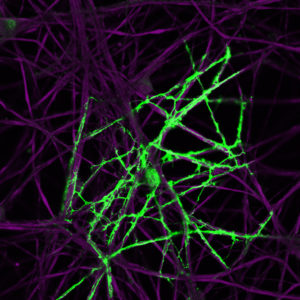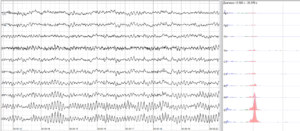Posts Tagged ‘memory’
Making Long-term Memories Depends on Making Myelin and Brainwaves
Neuroscientists have always presumed that learning and memory depend on strengthening or weakening the connection points between neurons (synapses), increasing or decreasing the likelihood that the cell is going to pass along a message to its neighbor. But recently some researchers have started pursuing a completely different theory that does not involve changing the strength of synaptic…
Read MoreGamma Waves in the Brain–Fumes or Fundamental?
SAN DIEGO—The most fundamental question of how information is coded and processed in the brain is being re-examined, and the controversy drew an overflow crowd of neuroscientists to participate in an intense debate at the Society for Neuroscience Annual Meeting in San Diego. The textbook explanation that information is coded digitally by the firing rate…
Read MoreBrian Williams ‘False Memory’–a Neuroscience Perspective
NBC News anchor Brian Williams apologized for his erroneous account of being aboard a helicopter forced to make an emergency landing after being hit by enemy fire while reporting on the Iraq war in 2003. Williams blames the fallibility of human recall for the error. How can the neuroscience of memory (and false memory) provide…
Read MoreHow is the brain like a guitar? Hint: It is all about rhythm
Typically we are introduced to the nervous system by analogy to an electrical circuit, like a door bell or a telephone line carrying a signal rapidly over long distance to activate a specific process. Never mind that electrical impulses are not transmitted through nerve axons anything like electrons flowing through a copper wire, this electronic…
Read MoreThe Brain’s White Matter–Learning beyond Synapses
Recently scientists have been exploring part of the brain that has been relatively unexplored in learning–white matter, comprising half of the human brain. Here new research is detecting cellular changes during learning that are entirely different from the synaptic changes between neurons in gray matter. A new study shows that learning a new motor skill…
Read MoreTransforming Terrorizing Memories
I’ll never forget it. They strapped electrodes to my wrist, cranked up a black dial on a frightening electronic device encrusted with switches and knobs, and shocked me repeatedly with jolts of electricity.
Read MoreErasing Memory: No Longer Science Fiction
The fact is, there is no convincing evidence that the memory of specific experience (called declarative memory) can be erased in humans–until now.
Read MoreBrain Cells that Communicate without Electricity: Calcium Waves in Glia
Glia are brain cells that cannot generate electrical impulses. As a consequence glia were thought to have no function in information processing or transmission. In fact glia were communicating with themselves and with neurons all along, but without using electricity. For a century neuroscientists were deaf to glial communication as they passionately studied neurons, because…
Read More
